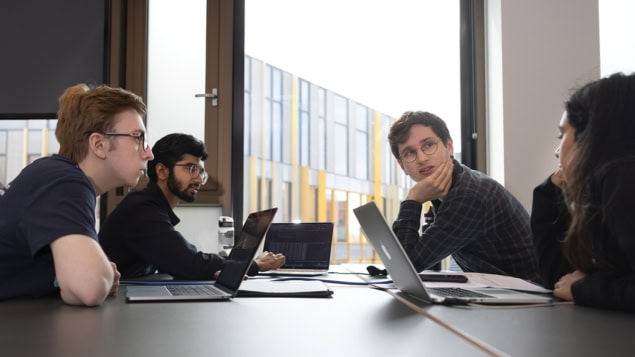The UK’s National Quantum Computing Centre offers a range of learning opportunities for people from diverse backgrounds to gain the skills needed to develop and program quantum computers

Whenever the quantum community comes together, there is always one thing that everyone can agree on: the need for more scientists and engineers with the specialist skills needed to build and operate quantum computers. While increased investment into the sector is certainly helping to swell the ranks of PhD students and early-career researchers with experience of both quantum hardware and software, their numbers are still likely to fall short of rising demand across academia, the burgeoning start-up sector, and larger organizations that are now looking to develop their own capability in this transformative technology.
Skills development and training has therefore become a crucial priority for the UK’s National Quantum Computing Centre (NQCC) as it works to build a quantum-ready economy. “Our aim is to build a talent pipeline that offers accessible routes into quantum computing for people at all stages of their career,” says Abby Casey, Quantum Readiness Delivery Lead at the NQCC. “We want to lower the barrier to entry, ensure that quantum computing is perceived as a desirable and attainable career option, and make it easier for people to imagine themselves as part of the future quantum workforce.”
Inspiring and upskilling
Some of the NQCC’s activities are clearly aimed at inspiring and supporting the next generation of quantum scientists and engineers. A summer school organized in collaboration with the University of Oxford offers sixth-form students an early insight into quantum computing, and includes visits to local quantum companies to show how such a futuristic technology has become a commercial reality. The NQCC also offers a growing number of summer placements across its technical and innovation teams, providing undergraduate students with direct experience of working in the quantum sector. “We want to provide opportunities for young people to participate, and to help them figure out whether this is a career they might be interested in,” explains Casey.
At the post-graduate level, meanwhile, Casey and her team are now scoping wide-ranging support packages for a new clutch of Centres for Doctoral Training (CDTs) that will be focused on quantum technologies – with the UK’s National Quantum Strategy aiming to train 1000 new PhD students across all areas of quantum science and engineering by 2033. Dedicated tutorials and training workshops will be run at the NQCC to help the students develop specific technical skills, and to provide them with a wider understanding of the quantum ecosystem and the impact of the technology on society. More tailored support to meet the needs of each CDT could include collaborative project work, access to quantum computing resources, community events, or placements at the national lab.
Equally important will be to enable technical specialists already working in adjacent fields – such as computer science, mathematics or physics – to develop the specialist skills and knowledge needed to work with quantum computers. “The numbers of fresh PhD students are relatively small compared with the existing workforce of scientists and engineers,” says Casey. “We want to provide upskilling opportunities for people with different backgrounds and experiences, and to offer them greater clarity on potential pathways into specific jobs within the quantum ecosystem.”
As a starting point, the NQCC has launched a non-mathematical, self-paced online course that offers a flexible and interactive learning environment for exploring the underpinning physics through to programming a quantum computer. For those who want to take a deeper dive, two intensive short courses are being run in partnership with the University of Bristol, with the NQCC offering a number of bursaries to cover the costs of the training. The first six-week programme provides a thorough grounding in quantum information theory, while the second builds on that knowledge to enable participants to understand key quantum algorithms and error-correction techniques.
“These courses are now in their third year, with participants including industry professionals, academic researchers and staff from the public sector,” comments Casey. “People who complete the training gain the skills and competencies that are highly relevant for a wide range of quantum roles.”

Alongside these formal courses, the NQCC also offers opportunities for industry professionals to experiment with emerging quantum algorithms and hardware. Through its SparQ user engagement programme the national lab has convened workshops focusing on particular industry sectors, including financial services, healthcare and pharmaceuticals, to explore the potential of quantum computing for tackling specific use cases. This has led to a number of pilot studies that are enabling end users to work alongside quantum experts to tackle problems that are relevant for their industry.
Ready, steady, hack
Learning and skills development are also central themes for the UK’s Quantum Hackathon, an annual event organized by the NQCC that this year will run for the third time at the University of Warwick on 22-24 July. During the event teams of hackers are challenged to devise quantum solutions to real-world problems posed by end users from different industry sectors, and to test their solutions using quantum processors based on different technology platforms. “There’s nothing like writing a piece of code, and running it on a real quantum computer, to engage with the technology and to understand its capabilities,” says NQCC director Michael Cuthbert.
For the hackers, most of whom are graduate students or early-career researchers, the open and collaborative working environment offers a way to exchange ideas, enhance their existing skills in quantum computing, and understand how different algorithms could be used in a range of practical scenarios. “It’s really good take a use case and connect it back to the quantum algorithms that could be used to solve the problem,” comments Maria Violaris, a PhD student at the University of Oxford. “Working with people from different backgrounds and with different levels of experience has been a great way to accelerate learning.”
For the industry mentors, meanwhile, the event offers a valuable opportunity to gain direct experience of using quantum hardware and software, and to explore emerging tools and techniques with expert assistance from the technology providers and the NQCC’s applications engineers. While some of the industry partners may have already taken steps to establish their own capability in quantum computing, for others it offers some early experimentation to understand the current capabilities of this rapidly evolving technology and how it could be used in their industry.
It’s clear to me that everyone who takes part in these events can learn something that they can take forward into their own work and future careers
In another important learning point, the teams are also challenged to explore the wider societal context of their solutions. “Responsible and ethical innovation, which aims to anticipate potential impacts, mitigate harms, and maximize the benefits, is increasingly recognized as a critical component of the innovation process,” comments Casey. “By introducing the teams to some key concepts at the start of hackathon, and asking them to build those ideas into their solutions, it is more likely that they will consider this important perspective as part of their own development work.”
The shared learning and knowledge exchange enabled through such an interactive and inclusive event epitomizes the overall ethos of the SparQ programme. “We want our teams to explore the types of problems that can be tackled by quantum computers, and to find out whether the technology offers the scale, performance and maturity to approach the use cases provided by our industry partners,” says Cuthbert. “It’s clear to me that everyone who takes part in these events can learn something that they can take forward into their own work and future careers.”
- A newly published technical report details the objectives and outcomes from the 2023 Quantum Hackathon, while more information about the 2024 event is available at www.nqcc.ac.uk/uk-quantum-hackathon-2024/.




